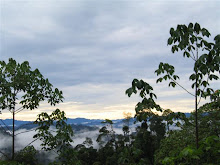SATURDAY JOKES - 209
2 hours ago
In the Jungle of Cyberspace - Fierce and Fearless Defender of the Poor, the Downtrodden, the Dispossessed and the Oppressed Sarawakians - INDEPENDENCE FOR SARAWAK - HQ FOR THE REPUBLIC OF SARAWAK
















 According to the BMF, Taib himself, his four children, eight siblings and his first cousin, Abdul Hamed Sepawi, have a stake in 332 Malaysian companies. In the three largest of these companies, the BMF contends, the Taib family owns substantial shares in Cahya Mata Sarawak or CMS (84 percent of net assets of RM2.4 billion), Custodev Sdn Bhd (25 percent of RM1.6 billion) and Ta Ann Holdings Bhd (at least 35 percent of RM1.4 billion).
According to the BMF, Taib himself, his four children, eight siblings and his first cousin, Abdul Hamed Sepawi, have a stake in 332 Malaysian companies. In the three largest of these companies, the BMF contends, the Taib family owns substantial shares in Cahya Mata Sarawak or CMS (84 percent of net assets of RM2.4 billion), Custodev Sdn Bhd (25 percent of RM1.6 billion) and Ta Ann Holdings Bhd (at least 35 percent of RM1.4 billion). "We are shocked to see that the Taib family has so shamelessly enriched itself while the people of Sarawak have to struggle with widespread poverty and an appalling lack of infrastructure and government services."
"We are shocked to see that the Taib family has so shamelessly enriched itself while the people of Sarawak have to struggle with widespread poverty and an appalling lack of infrastructure and government services." Sarawak Report founder Clare Rewcastle-Brown, during an interview on Family Trees, a Canadian prime-time television programme screened last Saturday on Global News, pointed out that investigating Taib's financial network is highly workable, because Taib family members openly own so many companies and such a huge chunk of international real estate.
Sarawak Report founder Clare Rewcastle-Brown, during an interview on Family Trees, a Canadian prime-time television programme screened last Saturday on Global News, pointed out that investigating Taib's financial network is highly workable, because Taib family members openly own so many companies and such a huge chunk of international real estate. "It has been possible for me, sitting in London, to go through the company records online and to trace how this money has gone from Sarawak in the early 1980s to Canada."
"It has been possible for me, sitting in London, to go through the company records online and to trace how this money has gone from Sarawak in the early 1980s to Canada."
 The scandal is doubly embarrassing because the agreement to establish the NFC, made when Abdullah Ahmad Badawi was prime minister, went to the family of Shahrizat Abdul Jalil (right), the
The scandal is doubly embarrassing because the agreement to establish the NFC, made when Abdullah Ahmad Badawi was prime minister, went to the family of Shahrizat Abdul Jalil (right), the However, the leadership has circled the wagons to protect her. In particular, Muhyiddin Yassin, the deputy prime minister, has said there was no case to be brought against her. Muhyiddin was the agriculture minister in 2006 when the project was approved. Others who have come to her defence are Abdullah Badawi and his son-in-law, Khairy Jamaluddin, the head of the Umno Youth Wing.
However, the leadership has circled the wagons to protect her. In particular, Muhyiddin Yassin, the deputy prime minister, has said there was no case to be brought against her. Muhyiddin was the agriculture minister in 2006 when the project was approved. Others who have come to her defence are Abdullah Badawi and his son-in-law, Khairy Jamaluddin, the head of the Umno Youth Wing. In the 2012 budget, Najib also announced the government would allocate RM200 million to guide 1,100 high-performing bumi companies with the potential for listing on the Kuala Lumpur Stock Exchange. Critics are concerned that the patronage system will continue unabated.
In the 2012 budget, Najib also announced the government would allocate RM200 million to guide 1,100 high-performing bumi companies with the potential for listing on the Kuala Lumpur Stock Exchange. Critics are concerned that the patronage system will continue unabated. Contained in the same 2010 auditor general's report, for instance, is a passage on the decision to privatise a 77-km stretch of highway from Senai to Desaru in Johor.
Contained in the same 2010 auditor general's report, for instance, is a passage on the decision to privatise a 77-km stretch of highway from Senai to Desaru in Johor. The company that won the RM1.7 billion contract is Ranhill Corp Sdn Bhd, which has long been described as Umno-linked. It is partly owned by Lambang Optimia Sdn Bhd. Both are headed by Hamdan Mohamad, described as Malaysia's ‘water baron', who operates several utilities and power companies.
The company that won the RM1.7 billion contract is Ranhill Corp Sdn Bhd, which has long been described as Umno-linked. It is partly owned by Lambang Optimia Sdn Bhd. Both are headed by Hamdan Mohamad, described as Malaysia's ‘water baron', who operates several utilities and power companies. Opposition member Tony Pua (left) complained on the floor of Parliament that the average price of RM29.4 million for each unit compared unfavourably with a Portuguese Army purchase of 363 similar vehicles for the equivalent of RM4.4 million each from the Swiss MOWAG CmBH Corp, Malaysia is paying a 6.6-fold increase over the Portguese purchase.
Opposition member Tony Pua (left) complained on the floor of Parliament that the average price of RM29.4 million for each unit compared unfavourably with a Portuguese Army purchase of 363 similar vehicles for the equivalent of RM4.4 million each from the Swiss MOWAG CmBH Corp, Malaysia is paying a 6.6-fold increase over the Portguese purchase. The auditor-general, in a 2007 report tabled in Parliament, alleged that a contract to build naval vessels given to PSC-Naval Dockyard, a subsidiary of Penang Shipbuilding & Construction Sdn Bhd, which was owned by another Umno crony, Amin Shah Omar Shah (right).
The auditor-general, in a 2007 report tabled in Parliament, alleged that a contract to build naval vessels given to PSC-Naval Dockyard, a subsidiary of Penang Shipbuilding & Construction Sdn Bhd, which was owned by another Umno crony, Amin Shah Omar Shah (right). Once called ‘Malaysia's Onassis' by Daim Zainuddin, Amin Shah was in trouble almost from the start, according to a report in Singapore's Business Times in 2005.
Once called ‘Malaysia's Onassis' by Daim Zainuddin, Amin Shah was in trouble almost from the start, according to a report in Singapore's Business Times in 2005. The irrepressible Raja Petra Kamarudin in early November found that the Philippines was buying Hamilton-class patrol ships from the US that would be deployed to the West Philippine Sea area to secure the country's natural resources.
The irrepressible Raja Petra Kamarudin in early November found that the Philippines was buying Hamilton-class patrol ships from the US that would be deployed to the West Philippine Sea area to secure the country's natural resources. I refer to Six hooligans to avoid (Sun Dec1) and see that UMNO Youth Chief, Mr. Khairy Jamlauddin is determined to carry on in the same ethnocentric disingenuous vein that characterizes the ruling UMNO led coalition. What follows is a brief opinion on the “Enam Jahanam” that Mr. Khairy points to as understood by an average member of the voting public.
I refer to Six hooligans to avoid (Sun Dec1) and see that UMNO Youth Chief, Mr. Khairy Jamlauddin is determined to carry on in the same ethnocentric disingenuous vein that characterizes the ruling UMNO led coalition. What follows is a brief opinion on the “Enam Jahanam” that Mr. Khairy points to as understood by an average member of the voting public.  But from all the symptoms I see, the vast majority of Malaysians are as “slightly less intelligent” as Dr M and his Umno/BN colleagues could possibly wish them to be, and gibbering idiots are as plentiful as ever.
But from all the symptoms I see, the vast majority of Malaysians are as “slightly less intelligent” as Dr M and his Umno/BN colleagues could possibly wish them to be, and gibbering idiots are as plentiful as ever. Like dimwit Perkasa president Ibrahim Ali, who welcomed the government’s retrograde Peaceful Assembly Bill 2011 as a “positive move”, adding that “after 54 years we have come to this stage. Maybe in the next 25 years people will be educated and can enjoy full freedom, but for the moment Malaysia still needs time to educate its citizens.”
Like dimwit Perkasa president Ibrahim Ali, who welcomed the government’s retrograde Peaceful Assembly Bill 2011 as a “positive move”, adding that “after 54 years we have come to this stage. Maybe in the next 25 years people will be educated and can enjoy full freedom, but for the moment Malaysia still needs time to educate its citizens.” So many far-from-idiotic and even formerly idiotic Malaysians have vented their outrage at all this chicanery, however, that Najib was recently moved to “implore” his Umno colleagues to “accept reform efforts or face an Arab Spring-style revolt”.
So many far-from-idiotic and even formerly idiotic Malaysians have vented their outrage at all this chicanery, however, that Najib was recently moved to “implore” his Umno colleagues to “accept reform efforts or face an Arab Spring-style revolt”.

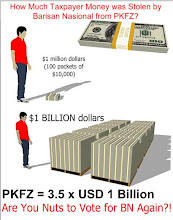


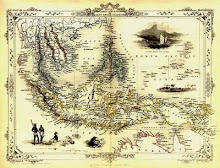
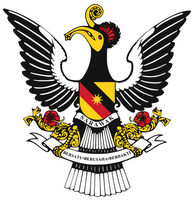
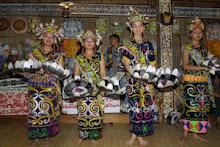











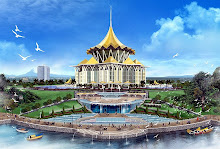



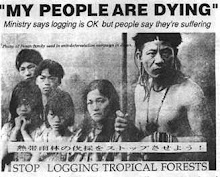

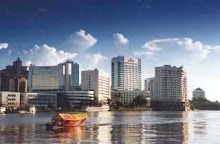








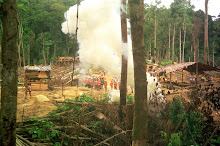




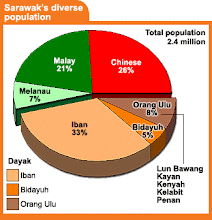
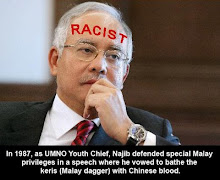

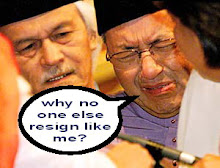

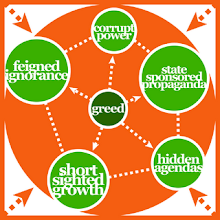

The Roots of Violence:
wealth without work,
pleasure without conscience,
knowledge without character,
commerce without morality,
science without humanity,
worship without sacrifice,
politics without principles.
- Mahatma Gandhi


